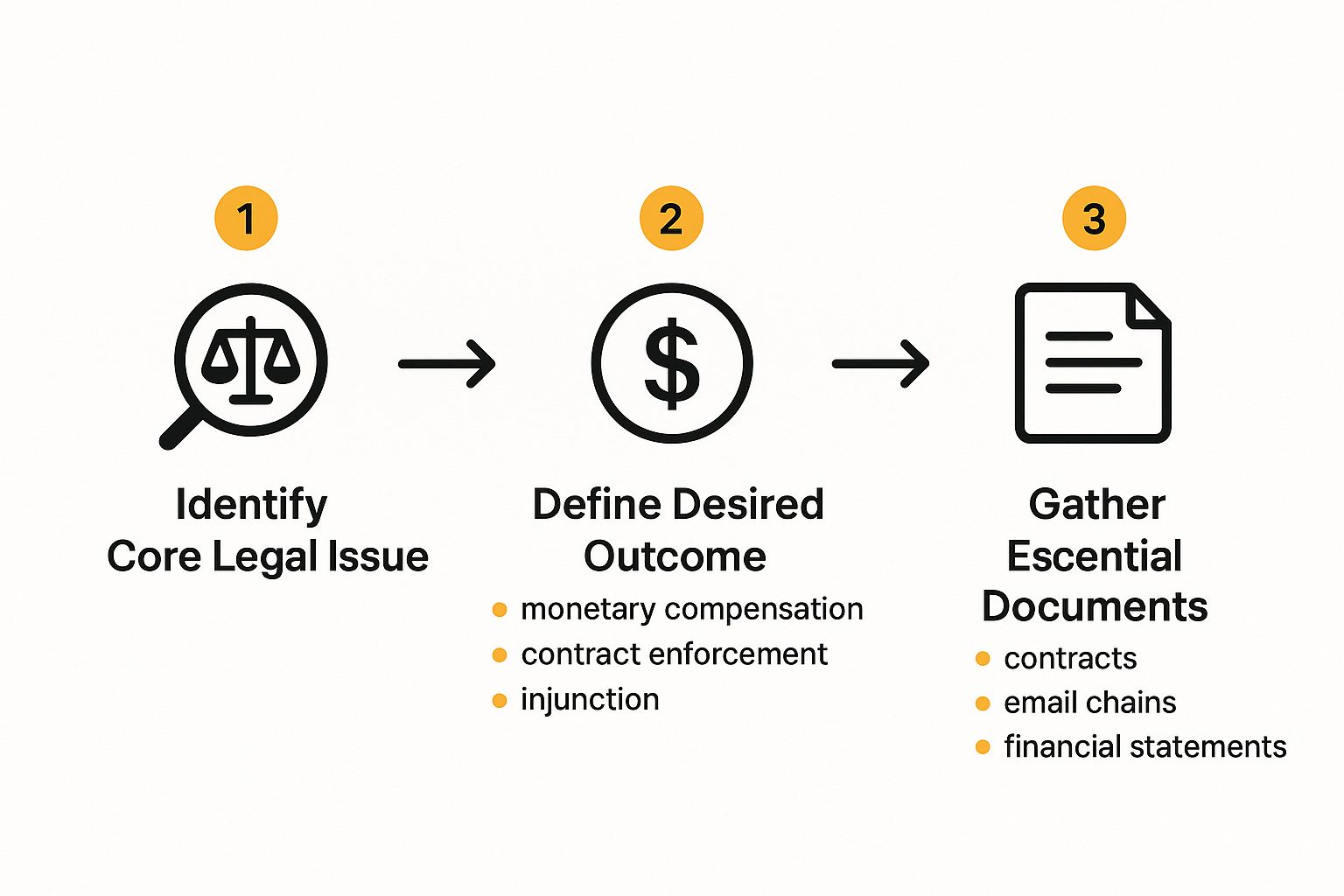Find Your Expert Civil Litigation Lawyer Burlington Today
When you’re facing a contract breach, a property line argument with a neighbour, or a claim of professional negligence, the first move you make is often the most important. That move? Finding the right civil litigation lawyer in Burlington. A seasoned lawyer is more than just a legal representative; they’re your guide through Ontario’s complex legal system, fighting for your best interests whether you’re at the negotiation table or in a courtroom.
This guide will walk you through exactly how to do that, so you can move forward with confidence.

Your Guide to Navigating Civil Disputes in Burlington
Let’s be honest: getting caught up in a legal dispute in Burlington or anywhere in the GTA is draining. It’s confusing, stressful, and can throw your life or business into chaos. Civil litigation—the formal process for resolving these non-criminal disagreements—is the arena where these battles are fought.
These disputes can come in all shapes and sizes, from a simple disagreement to a complex corporate conflict, but they all share one thing in common: they create uncertainty and financial pressure. The whole point of civil litigation is to cut through that uncertainty and find a resolution, whether that’s a settlement hammered out in mediation or a final judgment from a court.
Understanding the Local Legal Landscape
The legal industry in Canada is vast, and a significant percentage of legal professionals still operate within the traditional law firm model. This isn’t just a random statistic; it shows why finding a lawyer with a specific, specialized practice in a place like Burlington is so crucial. You need an expert, not a generalist.
Winning a case isn’t just about knowing the law. It’s about knowing the local court system, the procedures, and even the personalities involved right here in Ontario. Our firm is based in Burlington but we serve all of the Greater Toronto Area and the province of Ontario.
A strong legal strategy is built on a clear understanding of your rights and the legal pathways available to you. Your lawyer’s role is to illuminate that path and guide you toward the best possible outcome.
This guide is designed to be a practical, step-by-step resource for making a smart choice. We’ll cover everything from figuring out what you actually want to achieve to breaking down legal fees, all with a focus on what matters here in Burlington and the GTA. By understanding the core of litigation law services, you’ll be ready to pick a lawyer who not only has the right skills but is also the right fit for you.
Clarifying Your Goals Before the First Call
Before you even think about picking up the phone to call a civil litigation lawyer in Burlington, a bit of prep work on your end can make all the difference. Think of it this way: lawyers are expert problem-solvers, but they can’t solve a puzzle until they see all the pieces from your point of view.
Going into that first meeting without a clear goal is like asking a builder to construct a house without a blueprint. You’ll get something, but it probably won’t be what you wanted.
So, start by boiling down your issue into a few simple sentences. Is it a business partner who didn’t hold up their end of the bargain? A messy property line dispute with a neighbour? Maybe a professional whose negligence cost you dearly? Nailing down the core conflict is your starting line.
Defining What a Win Looks Like to You
Once you know what the problem is, you need to figure out what a solution looks like. A legal victory isn’t always a dramatic, movie-style courtroom battle. More often than not, the best outcome is the one that solves your problem efficiently and lets you move on.
What does that look like for you? It could be:
- Monetary Compensation: You need to recover money you’ve lost. This could be anything from unpaid invoices to the cost of fixing a botched home renovation.
- Specific Performance: You just need the other person to do what they promised. A classic example is forcing a property sale to go through as outlined in the contract, a common issue in Ontario’s real estate market.
- An Injunction: You need to stop someone from causing more harm. This could mean getting a court order to prevent a former employee from using your company’s confidential client list, a crucial protection for many businesses.
Knowing what you’re aiming for helps a lawyer immediately gauge if your goal is realistic and start sketching out a strategy to get you there.
Gathering Your Essential Documents
There is no better way to get a sharp, accurate assessment of your case than walking into a consultation prepared. Before you book that first meeting, start pulling together all the paperwork. This isn’t just about being organized; it’s about laying the foundation for your entire legal argument.
The infographic below breaks down the simple, three-step process you should follow before you reach out.

As you can see, each step builds on the last, turning a stressful jumble of events into a clear story that a lawyer can quickly understand and act on.
Your organized file allows a potential lawyer to move past the “what happened” and get straight to “here’s what we can do.” This saves you time and money from the very first meeting.
Start collecting the obvious things: contracts, invoices, and financial statements. But don’t forget the rest of the story, which is often found in email chains, text messages, and even photographs. Don’t try to be the judge of what’s important—bring it all and let your lawyer sort it out.
Having this information ready shows you’re serious and makes that initial conversation incredibly productive. When you’re ready to take this step, our team is ready to listen. You can easily connect with us to schedule a consultation.
How to Properly Vet a Burlington Litigation Lawyer
So, you’ve got a shortlist of potential lawyers. Great. But a quick Google search is just the starting line—the real work of vetting them begins now. This is the part where you make sure the person you hire not only has the right credentials on paper but also possesses the specific, real-world experience to navigate your case through the Ontario legal system.

Before you do anything else, your first move should be to verify their professional standing. The Law Society of Ontario (LSO) provides a public directory that lets you confirm a lawyer is licensed and in good standing to practise in the province. This search is non-negotiable; it also shows any public disciplinary history, which is something you absolutely want to know upfront.
Once you’ve confirmed they have a clean LSO record, it’s time to dig a little deeper.
Aligning Their Experience with Your Needs
Here’s something many people overlook: not all litigation experience is the same. A brilliant lawyer who specializes in massive commercial disputes in downtown Toronto might not have the nuanced understanding needed for a real estate conflict brewing in the Halton Region. You need a civil litigation lawyer in Burlington whose expertise is a direct match for the specifics of your problem.
For instance, if you’re dealing with a shareholder dispute, you should be looking for a lawyer whose website and professional profile are packed with terms like “corporate and commercial litigation.” If your case involves a construction lien, you want someone who clearly has a deep and practical grasp of Ontario’s Construction Act.
A lawyer’s track record is your best predictor of future success. Look for specific, relevant experience, not just a general claim of being a “litigator.”
The best place to start this deep dive is on their firm’s website. Don’t just skim the practice area pages—look for actual proof of their work.
What to Look for on Their Website
A lawyer’s website is their digital storefront, and it can tell you a lot about their focus, experience, and success. Here’s what you should be hunting for:
- Detailed Case Results: While confidentiality is key, many firms post anonymized summaries of successful cases. These are goldmines of information, offering real-world examples of the kinds of complex problems they’ve actually solved.
- Client Testimonials and Reviews: What are former clients saying? Honest feedback can give you a genuine feel for a lawyer’s communication style, responsiveness, and how they handle the pressures of a case. You can see how we operate by reading our own client reviews to see what people say about our approach.
- Lawyer Biographies: A good bio goes beyond their law school. It should detail their specific practice areas, the courts they frequently appear in (like the Ontario Superior Court of Justice), and any notable publications or professional memberships.
In a crowded legal market, top-tier litigators with proven track records are always in demand. Taking the time to do this diligence now is what separates a decent choice from finding the absolute best advocate for your case.
Verifying Professional Credentials
Before you commit, it’s wise to run a final check on a lawyer’s credentials to ensure they are fully qualified and in good standing. This isn’t about distrust; it’s about being a well-informed client. Use this quick checklist to confirm everything is in order.
Key Credentials to Verify for an Ontario Lawyer
| Credential or Status | What It Means | Where to Check |
|---|---|---|
| Licensed by the LSO | The lawyer is legally permitted to practise law in Ontario. | LSO Lawyer and Paralegal Directory |
| Good Standing | There are no current suspensions or restrictions on their licence. | LSO Directory (check their status) |
| Errors and Omissions Insurance | They carry mandatory professional liability insurance for client protection. | LSO Directory (indicated as “Insured”) |
| Disciplinary History | A record of any public professional misconduct findings against them. | LSO Directory (check under the “Regulatory History” tab) |
Completing these simple checks gives you the confidence that you’re hiring a qualified professional who meets Ontario’s high standards for legal practice.
Asking the Right Questions to Find the Right Lawyer
That first meeting, the initial consultation, is your single best chance to get a real feel for a lawyer. It’s more than just them sizing up your case; it’s your interview. You’re hiring someone for a crucial role, and walking in prepared with smart questions changes the entire dynamic.
Forget the generic stuff. Asking “What’s your experience?” will just get you a polished, pre-packaged answer. You need to get under the hood. The goal here is to figure out how they think, how they work, and what that means for you, your case, and your bank account.
This isn’t just about finding a competent civil litigation lawyer in Burlington. It’s about finding one who’s the right fit for you.
Digging Into Their Real-World Experience and Strategy
A lawyer’s track record can tell you a lot, but “experience” isn’t just about how many years they’ve been practising law. What you need is relevant, recent success in the specific courthouse and with the type of problem you’re facing.
Your questions need to be sharp enough to cut through the fluff. Frankly, a good lawyer will be impressed by pointed, well-thought-out questions. It shows them you’re taking this seriously.
Try these on for size:
- “Have you handled cases like mine, with these kinds of facts, at the Halton Region Courthouse recently?” This is a fantastic question because it’s so specific. It immediately tells you if they know the local landscape—the procedures, the judges, the other lawyers in Burlington and Milton. That local knowledge is invaluable.
- “From what you’ve heard so far, what do you see as the immediate strengths and weaknesses of my case?” This question forces them to think on their feet and give you a preliminary analysis. You’ll quickly see how they approach problems and whether they’ll give you the straight goods, not just what you want to hear.
- “What’s your default approach—are you more likely to push for a settlement or take it all the way to trial?” This gets to the heart of their legal philosophy. There’s no single right answer, but it needs to align with your situation. Sometimes you need a bulldog ready for a fight; other times, you need a savvy negotiator who can get things done without the time and expense of a trial.
Nailing Down How They’ll Manage Your Case (And Your Sanity)
Let’s be honest, legal battles are marathons, not sprints. They can be incredibly stressful, and feeling out of the loop only makes it worse. Vague promises about “keeping you in the loop” are a red flag.
A clear, upfront communication plan is the bedrock of a good lawyer-client relationship. It avoids frustration, manages expectations, and makes sure you never feel like a spectator in your own case.
You need to set those expectations right from the beginning. These questions will tell you a lot about how their office actually runs:
- “How do you typically keep clients updated on their files?” Do they schedule calls? Send summary emails? Use a client portal? It’s also fair to ask who you’ll be hearing from—the main lawyer, a junior associate, or a paralegal?
- “What’s your standard turnaround time for returning a call or an email?” A commitment to getting back to you within one or two business days is a reasonable expectation. Getting that on the record now can save you a world of anxiety later.
- “Who will I be dealing with day-to-day, and who is the lead strategist on my file?” This is a key question. It’s perfectly normal for paralegals and junior lawyers to handle tasks to keep costs down, but you need to know who is ultimately steering the ship and who your main point of contact is.
Making Sense of Legal Fees and Retainer Agreements
Once you’ve found a lawyer who feels like the right fit, the conversation will naturally shift to the cost. For many people, this is the most daunting part of the process, but getting a clear handle on the financial side of things is crucial for your peace of mind. Any good civil litigation lawyer in Burlington will be completely upfront about their fee structure right from the start.

In Ontario, law firms usually bill for their services in a few standard ways. You’re probably familiar with the hourly rate, where you’re billed for the lawyer’s time in small increments. Another common model is the flat fee, which is a single, set price for a defined piece of work, like drafting a specific legal document.
The most important thing is to get clarity on this from day one. No one likes financial surprises, especially when dealing with a legal dispute.
Understanding the Retainer Agreement
Before your lawyer can officially start working on your file, you’ll need to sign a retainer agreement. This isn’t just another form to sign; it’s the foundational document that maps out your entire professional relationship. At this stage, you’ll also provide a retainer fee, which acts as a deposit for the legal services you’ll receive.
This money doesn’t go directly to the lawyer. Instead, it’s held in a special trust account managed by the law firm. As your lawyer puts time into your case, they will draw from these funds and send you detailed invoices explaining every charge. The Law Society of Ontario has strict rules requiring these agreements to be both clear and thorough.
A proper retainer agreement in Ontario must spell out:
- Scope of Services: A precise description of what legal work the lawyer is being hired to do (and just as importantly, what they won’t be doing).
- Fee Structure: A full breakdown of how you will be billed, including the hourly rates for different people on the team (like senior lawyers vs. paralegals) or the terms of a flat fee.
- Disbursements: An explanation of how out-of-pocket costs will be billed and managed.
This document is there to protect both of you by making sure everyone is on the same page from the very beginning.
What Are Disbursements?
Beyond what you pay your lawyer for their time and expertise, your case will have other expenses called disbursements. Think of these as the operational costs of your lawsuit—the out-of-pocket expenses your lawyer covers on your behalf to keep your case moving forward.
Common disbursements in an Ontario civil litigation file often include:
- Court filing fees
- Costs for a process server to deliver legal documents
- Fees for hiring expert witnesses to write reports or testify
- Charges for photocopying, couriers, and printing
- Mediation or arbitration facility costs
These expenses are billed back to you, usually on a monthly invoice. It’s a smart move to ask for a rough estimate of potential disbursements so you can plan your budget. While no one has a crystal ball, an experienced lawyer can give you a realistic ballpark based on similar cases they’ve handled. Reviewing a firm’s track record can show you how they manage cases efficiently, which is why we invite potential clients to see our documented case results.
Managing your legal spend is an active process. Don’t be afraid to ask for regular updates and detailed invoices. A transparent billing process is the hallmark of a trustworthy lawyer-client relationship.
Modern law firms are also adapting to make this easier. The vast majority of firms now accept online payments, which helps speed things up and gives clients a much more convenient way to manage their legal bills. This shift to digital payments, as highlighted in this overview of legal industry trends, creates more transparency and simplicity for everyone involved.
Common Questions About Hiring a Litigation Lawyer
Even after you’ve gone through the process of vetting a lawyer and getting a handle on their fees, practical questions always seem to surface. Let’s be honest, facing a civil dispute in Ontario can feel like staring down a long, uncertain road. Knowing what to expect makes the whole journey a lot less daunting.
Here are some straightforward answers to the questions we hear most often from clients.
A good civil litigation lawyer in Burlington will be upfront about these things right from the start, making sure you’re never left in the dark.
How Long Does a Civil Case Take in Ontario?
This is the million-dollar question, and unfortunately, there’s no single, simple answer. Every case has its own rhythm.
I’ve seen straightforward contract disputes get sorted out through negotiation in just a few months. On the other hand, I’ve also managed complex files with multiple parties, a mountain of documents to review during discoveries, and a series of court motions that took years to get anywhere near a trial at the Ontario Superior Court of Justice.
An experienced lawyer won’t give you a vague guess. They’ll look at the specifics of your situation—the complexity, the court’s current schedule, and even the temperament of the opposing side—to give you a realistic timeline.
Mediation Versus Arbitration in Ontario
You’ll definitely hear the words “mediation” and “arbitration” thrown around as alternatives to a full-blown trial. They both aim to resolve disputes without a judge in a traditional courtroom, but they are fundamentally different processes here in Ontario.
-
Mediation: Think of this as a structured, collaborative conversation. A neutral third party, the mediator, comes in to help everyone find a path to a voluntary settlement. Nothing is binding. The key word here is voluntary—no one can force you into an agreement. It’s worth noting that in some places, like Toronto, mediation is a mandatory step before you can even get a trial date.
-
Arbitration: This is much more like a private trial. An arbitrator listens to the evidence presented by both sides and then makes a legally binding decision. That decision carries the weight of a court order and can be enforced.
Deciding which route to take is a strategic choice. Your lawyer will be your best guide on which process gives you the upper hand based on the specifics of your conflict.
Understanding the distinction between these dispute resolution methods is key. Mediation is about finding common ground, while arbitration is about having a final decision made for you outside the public court system.
Can I Switch Lawyers Mid-Case?
The short answer is yes. You always have the right to change your legal representation in Ontario, at any point in your case.
However, this isn’t a decision to take lightly. Your previous lawyer has a right to be paid for all the work they’ve done up to that point. They can place what’s called a solicitor’s lien on your file, which means they can hold onto your documents and case materials until their final account is settled.
To make the switch as seamless as possible, you need a plan. It’s critical to discuss the situation with your potential new lawyer first. They can help you navigate the handover and get your file moving again. For more advice on getting it right the first time, you can check out our tips for choosing among the many excellent Burlington, Ontario lawyers in the area.
At UL Lawyers, we believe clear answers and strong advocacy go hand-in-hand. If you’re dealing with a civil dispute in Burlington or the GTA, reach out for a consultation. We’ll help you understand your rights and the legal path ahead. https://ullaw.ca
Related Resources
A Simple Guide to Passing the Citizenship Test in Canada
Continue reading A Simple Guide to Passing the Citizenship Test in CanadaHow to Make a Will in Ontario: A Complete Guide
Continue reading How to Make a Will in Ontario: A Complete GuideNEED A LAWYER?
We are here 24/7 to address your case. You can speak with a lawyer to request a consultation.
905-744-8888GET STARTED WITH A FREE CONSULTATION
Why Choose UL Lawyers
- Decades of combined experience
- Millions recovered for our clients
- No fee unless we win your case
- 24/7 client support
- Personalized legal strategies